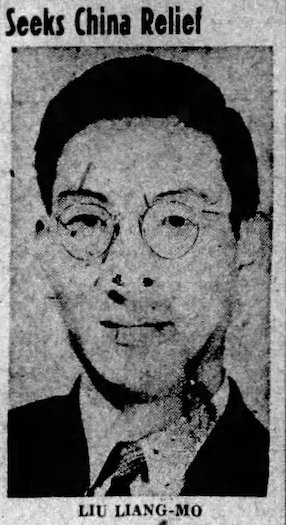More languages
More actions
Liu Liangmo 刘良模 | |
|---|---|
 | |
| Born | 6 November 1909 Ningbo, China |
| Died | 8 August 1988 Shanghai, China |
| Nationality | Chinese |
Liu Liangmo (6 November 1909 – 8 August 1988) was a Chinese anti-imperialist revolutionary and musician.
Early life[edit | edit source]
Liu converted to Christianity in middle school and joined the choir at the Baptist-founded University of Shanghai.[1]
War of Resistance[edit | edit source]
Liu joined the anti-imperialist movement following the Japanese invasion of Manchuria. He founded the People's Song Association, which had over 1,000 members by 1936. Nie Er, a fellow leftist cultural worker, composed the "March of the Volunteers", which has been the anthem of China since 1978. Following the formation of the Second United Front, Liu went to the front to teach songs to soldiers. Chiang Kai-shek shut down his project because he believed it promoted communist organizing.[1]
United States[edit | edit source]
Liu left China in 1940 and moved to the United States to work with the United China Relief and raise money for the resistance against Japan. He met with Paul Robeson and helped translate Chinese patriotic songs into English. Together, they released the album Chee Lai in 1941. Liu spoke at Lincoln University in 1942 and connected the fight international against fascism with the U.S. struggle against Jim Crow racism. From 1942 to 1945, he served as a columnist for the Pittsburgh Courier, the largest Black newspaper in the USA. He and Robeson participated in rallies for the freedom of India from British occupation. Liu criticized Chiang Kai-shek for his failures in the war against Japan. The Courier ended his column in 1945 after Chinese nationalists ostracized the pan-Africanist Alphaeus Hunton.[1]
Return to China[edit | edit source]
Liu returned to China in 1949 and supported the Three-Self Patriotic Movement, which became the dominant form of Protestantism in China. He became part of the Shanghai government in the late 1970s and became Vice Chairman of the Shanghai Political Consultative Conference in 1982. He died in 1988.[1]
References[edit | edit source]
- ↑ 1.0 1.1 1.2 1.3 Eugene Puryear (2023-03-20). "Liu Liangmo: China’s anti-imperialist, anti-racist, Christian revolutionary (pt. 1)" Liberation School. Archived from the original on 2023-04-09. Retrieved 2023-04-12.
